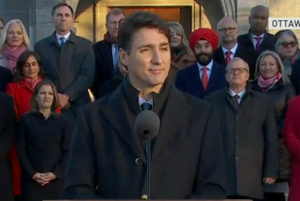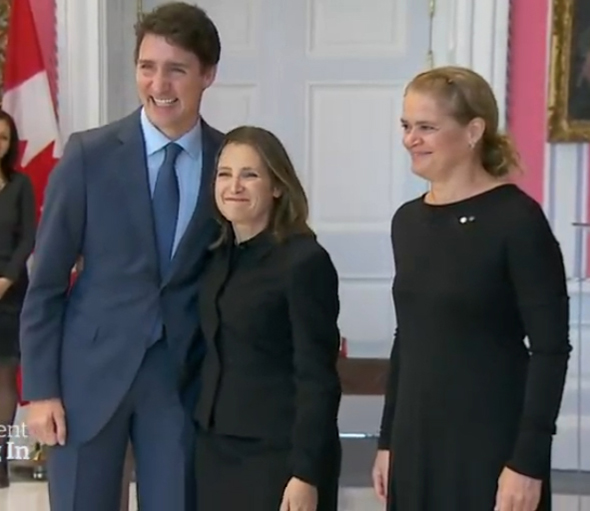
Wednesday November 20, 2019 ~ OTTAWA
by Mary P Brooke ~ West Shore Voice News
Today November 20 in Ottawa the new federal Liberal cabinet was sworn in during an official ceremony at Rideau Hall.
With Governor General Julie Payette presiding, Prime Minister Justin Trudeau appointed 35 Ministers (as well as special representative) to his new cabinet at this start of the 43rd Parliament of Canada. A larger cabinet shows attention to a broader range of issues in the socioeconomic framework of the country. Including the PM, the Cabinet has 37 members.
Trudeau told media after the formal event that he has “strong ministers in all positions”.
“This team will work to deliver real, positive change for all Canadians,” said Trudeau in a news release. “People expect Parliamentarians to work together to deliver these results, and that’s exactly what this team will do.”
As a sign of stability, Bill Morneau remains Minister of Finance and Marc Garneau remains Minister of Transportation. Morneau will have the support of Mona Fortier as the new Minister of Middle Class Prosperity and Associate Minister of Finance.
Not long in the job ahead of the October 2019 election, David Lametti remains Minister of Justice and Attorney General.

Moving from Foreign Affairs back to a powerful home-base position is Chrystia Freeland who becomes Deputy Prime Minister and Minister of Intergovernmental Affairs. This shows not only Trudeau’s fullest possible confidence in Freeland but also the importance this government is putting on relations among the provinces. National unity, energy and environment and US relations are important in Trudeau’s working relationship with Freeland in intergovernmental affairs and as deputy prime minister, he told media.
Despite his battle with cancer, Jim Carr has been appointed as the prime minister’s special representative for the Prairies, also as a way to demonstrate attention to regional challenges. Carr will be “a direct voice on concerns about the prairies,” Trudeau told media. “He will be our voice in Saskatchewan, Manitoba and Alberta.”
The Minister of Seniors is a relative newcomer. First elected in 2015, Deb Schulte with a background in mechanical and aerospace engineering will head up the Seniors ministry.
From BC, Jonathan Wilkinson who previously headed up Fisheries & Oceans, is now Minister of Environment and Climate Change.
Former Minister of Environment and Climate Change Catherine McKenna gets the Minister of Infrastructure and Communities post. McKenna is a strong performer, so this appointment indicates a government policy priority for infrastructure development across Canada. In total, six ministers will have input into aspects of the environment, said Trudeau today in a media scrum after the formal event.
A new Ministry of Digital Government will be headed up by Joyce Murray who has represented the Vancouver Quadra riding since 2008.
A staunch loyal cabinet minister from the previous session, Carla Qualtrough becomes Minister of Employment, Workforce Development and Disability Inclusion.
Seamus O’Regan will have the tough Trans Mountain pipeline and oil-related Alberta economic issues to deal with as the new Minister of Natural Resources.
Not returning to cabinet are Kirsty Duncan (former Science minister) and Ginette Petitpas Taylor (former Health Minister, 2017-2019). But they have new roles under the leadership of Government House Leader Pablo Rodriguez: the following team will work with all parties to make progress on the priorities that matter most to Canadians:
- Kirsty Duncan will serve as Deputy Leader of the Government in the House of Commons
- Mark Holland will serve as Chief Government Whip
- Ginette Petitpas Taylor will serve as Deputy Government Whip
- Kevin Lamoureux will serve as Parliamentary Secretary to the Leader of the Government in the House of Commons
In the Prime Minister’s release, it was stated: “On election day, Canadians chose to continue moving forward. From coast to coast to coast, people chose to invest in their families and communities, create good middle class jobs, and fight climate change while keeping our economy strong and growing. Canadians sent the message that they want us to work together to make progress on the issues that matter most, from making their lives more affordable and strengthening the healthcare system, to protecting the environment, keeping our communities safe, and moving forward on reconciliation with Indigenous peoples.”
Trudeau mentioned Ralph Goodale and Amarjit Sohi as two former MPs and cabinet ministers who were not re-elected from the western provinces, and said they will be missed.
Here is the full list of new cabinet ministers:
–Chrystia Freeland becomes Deputy Prime Minister and Minister of Intergovernmental Affairs.
–Anita Anand, a new entry to cabinet, becomes Minister of Public Services and Procurement.
–Navdeep Bains becomes Minister of Innovation, Science and Industry.
-Carolyn Bennett remains Minister of Crown-Indigenous Relations.
–Marie-Claude Bibeau remains Minister of Agriculture and Agri-Food.
–Bill Blair becomes Minister of Public Safety and Emergency Preparedness.
–Bardish Chagger becomes Minister of Diversity and Inclusion and Youth.
–Francois-Philippe Champagne becomes Minister of Foreign Affairs.
–Jean-Yves Duclos becomes President of the Treasury Board.
–Mona Fortier, a new entry to cabinet, becomes Minister of Middle Class Prosperity and Associate Minister of Finance.
–Marc Garneau remains Minister of Transport.
–Karina Gould becomes Minister of International Development.
–Steven Guilbeault, a new entry to cabinet, becomes Minister of Canadian Heritage.
–Patty Hajdu becomes Minister of Health.
–Ahmed Hussen becomes Minister of Families, Children and Social Development.
–Melanie Joly becomes Minister of Economic Development and Official Languages.
–Bernadette Jordan becomes Minister of Fisheries, Oceans and the Canadian Coast Guard.
–David Lametti remains Minister of Justice and Attorney General.
–Dominic LeBlanc becomes President of the Queen’s Privy Council for Canada.
–Diane Lebouthillier remains Minister of National Revenue.
–Lawrence MacAulay remains Minister of Veterans Affairs and Associate Minister of National Defence.
–Catherine McKenna becomes Minister of Infrastructure and Communities.
–Marco E. L. Mendicino, a new entry to cabinet, becomes Minister of Immigration, Refugees and Citizenship.
–Marc Miller, a new entry to cabinet, becomes Minister of Indigenous Services.
–Maryam Monsef becomes Minister of Women and Gender Equality and Rural Economic Development.
–Bill Morneau remains Minister of Finance.
–Joyce Murray becomes Minister of Digital Government.
–Mary Ng becomes Minister of Small Business, Export Promotion and International Trade.
–Seamus O’Regan becomes Minister of Natural Resources.
–Carla Qualtrough becomes Minister of Employment, Workforce Development and Disability Inclusion.
–Pablo Rodriguez becomes Leader of the Government in the House of Commons and will be assuming the responsibility of Quebec Lieutenant.
–Harjit Sajjan remains Minister of National Defence.
–Deb Schulte, a new entry to cabinet, becomes Minister of Seniors.
–Filomena Tassi becomes Minister of Labour.
–Dan Vandal, a new entry to cabinet, becomes Minister of Northern Affairs.
–Jonathan Wilkinson becomes Minister of Environment and Climate Change.
-Also, Jim Carr will serve as the prime minister’s special representative for the Prairies.
The Prime Minister also announced changes to the structure and mandate of the Cabinet committees to reflect Canadians’ top priorities. The new list of Cabinet committees is as follows:
- Cabinet Committee on Agenda, Results and Communications
- Cabinet Committee on Operations
- Cabinet Committee on Global Affairs and Public Security
- Cabinet Committee on Reconciliation
- Cabinet Committee on Economy and the Environment
- Cabinet Committee on Health and Social Affairs
- Treasury Board
- Incident Response Group
“Canadians can count on equality of women” as part of this new cabinet, said Trudeau. “We recognize the challenges in defending women’s rights,” he told media.

Today Trudeau used reading glasses while signing official documents, which elicited chuckles and applause from the room.
Former Attorney General Adrienne Clarkson was in attendance at the event.
A presentation by Indigenous throat singers was part of the event before ministers went outdoors for the prime minister’s scrum with media.
Trudeau said he looks forward to collaborating with all parties in the house. The House of Commons will be convened on December 5, 2019.
Getting right down to work with addressing regional and big-city interests, Trudeau will meet with two big-city mayors on Thursday November 21 in Ottawa. In his office in the West Block he will meet first with Calgary Mayor Naheed Nenshi and then with Vancouver Mayor Kennedy Stewart.


